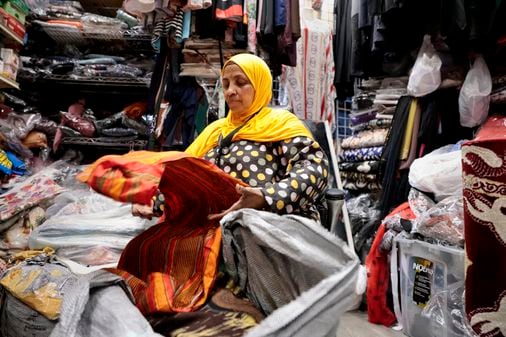Ahmed stared at the stacks of teff flour and U-Haul boxes lining the store aisles. One of her hands fidgeted with a black marker, while the other cradled her anxiety-stricken head.
“I can’t even sleep at night,” she said.
As tenants-at-will, these half-dozen businesses can be legally evicted at any time. The situation reflects how Boston’s rising cost of living is inspiring many of the city’s commercial landlords to increase their rents, at times forcing small businesses out of the market. With the potential loss of the East African market, vulnerable business owners — immigrants, Black people, Muslims, women, and non-English speakers — and the customers who depend on them, are feeling the effects the most, advocates said.
For the past two years, property owner Boston Real Estate Collaborative has been transforming sections of the 100-year-old building into market-rate apartments, and now plans to gut the dilapidated commercial area occupied by Ahmed and other East African entrepreneurs to create a modern space for new businesses. So far, half of the warehouse has been converted into a mix of micro-flat studios and office space.
Will Avanessian, founding partner of Boston Real Estate Collaborative, declined interview requests from the Globe.
“With every project, we are looking for new ways to provide better and more affordable housing, hospitality, or commercial experiences,” the company’s website reads. “Our ultimate mission is to help make Boston more accessible and appealing for residents, visitors and businesses alike.”
In 2021, the company tried to get approval for a large-scale redevelopment of the warehouse, with more commercial space, but failed to win city approval. Then, in a revised plan, the company offered discounted leases to six of the longest-running shops, out of the more than a dozen businesses, all immigrant owned.
City Hall and local agencies have tried to find new homes for the left-out businesses. Some relocated on their own, and recently two were trying to move into spaces a three-minute drive away on Dudley Street.

As of Friday, none of the remaining businesses that have to leave had signed a lease elsewhere.
“Everybody wants high-paying tenants, but the small businesses, arts businesses, immigrant businesses, are what make the flavor of the area,” said Joyce Stanley, former executive director of the nonprofit once known as Dudley Square Main Streets, now Roxbury Main Streets, which promotes economic development in the neighborhood.
In February 2022, the business owners received their first notices to leave. The African Community Economic Development of New England got legal support from Lawyers for Civil Rights Boston, and, with its guidance, called on City Hall to halt the ongoing development project. Court proceedings are ongoing, and the Lawyers for Civil Rights Boston negotiated settlement agreements for some shops in May. But in early July, the developer issued another round of notices to vacate by the end of the month.
Emma Pettit, press secretary for Mayor Michelle Wu, said in a statement the city has offered help “to both ensure the businesses experience a smooth transition to a new location and are set up for long term success moving forward.”
‘Everything depends on the bottom line’
For decades, the warehouse on Harrison Avenue formed a reputation as an “incubator space” for emerging, immigrant enterprises, Stanley said.
“We’ve had African Americans, Ethiopians — and the Somalis came later,” Stanley said. “There were Koreans, and lots of artists,” too.

Customers said they depend on the imported spices, traditional wedding dresses, and ethnic skincare products that are hard to find in New England and offer a piece of home in a foreign land.
The building was under the ownership of Nicholas A. Spileos for nearly four decades, according to property records, until the Boston Real Estate Collaborative purchased it for $4.5 million in January 2019.
Whitney Gallivan, managing director and partner of Boston Realty Advisors, which does not have an interest in the property, said that much like residential landlords, developers have no legal obligations to help displaced businesses move.
While Nubian Square is filled with vacant storefronts, some available properties are not in good enough condition to welcome new commercial tenants, and those that are want much higher rents. Some of the businesses said they paid as little as $300 a month for their lease.
“Unfortunately, everything depends on the bottom line, and how the numbers shake out and work,” Gallivan said. “Everyone has different goals behind their development, and what matters to them.”
‘I started here’
In 2013, when Ahmed first eyed the rustic, outdated building in Roxbury as the home for her family business, all odds were against her. A lack of parking might prevent commuting customers from reaching the store. It’s “a bad area,” “a Black area,” so your business will suffer, people advised her.
“We said, ‘We will do it,’” Ahmed recalled her and her husband, Dessie, telling skeptics. “When the business is good, the business will run.”

Eleven years later, their store, Ledeta Gebeya, has a steady clientele of mostly African immigrant customers buying food, cookware, toiletries, and Bibles imported from Ethiopia, Ahmed’s home country, or purchased on trips overseas.
One Tuesday, a customer bought teff flour, commonly used for injera, a flatbread used as an edible platter and utensil for East African meals. When asked where she found the flour in Boston before Ledeta Gebeya opened, the customer said, “I started here.”
Ahmed said she doesn’t know where her customers will find these products if the store closes.
“They need me,” she said.
On the warehouse’s second floor, Somalia native Safiya Adow runs Safiya’s Fashion, a traditional clothing and beauty store, then heads to an 8-hour housekeeping shift at Hebrew SeniorLife, an assisted living center, each day. When money is extra tight, she picks up housekeeping gigs on the side.
“Somali moms work hard with no support,” she said with the help of a Somali interpreter.
Because she’s an immigrant, Adow said people often think “we come here and take stuff.” But Adow said she contributes to the economy and hires people to watch the shop when she is overseas.

Some of her friends and family have suggested moving out of Boston altogether, to Minneapolis or Columbus, Ohio, cities with stable shopping malls for the Somali diaspora.
But, “if the Somali community comes together, we can have our own mall” in Boston, Adow said.
‘Where are you going to go?’
The warehouse these East African businesses call home has seen brighter days. Black graffiti mars the brick walls. Unhoused people wander the building. Some shop owners work in cramped conditions, with outdated utilities.
The business owners make do with what they have. Sacks of sun-dried injera, fava bean powder, and mitmita seasoning mix sit in neat stacks. Dozens of Somali diracs, traditional dresses of all colors, hang from one shop’s ceiling.


Susan Kesselly, of Holbrook, said this is the only place where she can find a piece of her heritage. On a recent Wednesday, she drove an hour to buy her daughter an outfit for an ordination ceremony back in her home country, Liberia. It has become a ritual, she said, to stop by the market to pick up clothing before each trip abroad, because “you can’t find this on Amazon.”
Scanning the inventory of Amin Fashion on a recent day, Kesselly asked owner Amal Ahmed if she had a navy blue dress. The shopkeeper rummaged through plastic storage bins and burlap sacks to no avail. It’s already packed, Ahmed explained.
Kesselly decided on a yellow topaz-hued garb.
“Where are you going to go,” Kesselly asked.
Ahmed raised her henna-covered hands. “No place to go,” she said.

Tiana Woodard can be reached at tiana.woodard@globe.com. Follow her @tianarochon.











